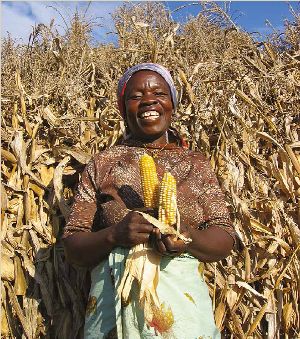Plant genetic resources are the raw material for crop genetic improvement, food and nutrition security. Their conservation and management are essential and depend on the rights of farmers, especially those in the centers of origin and diversity, to save, use, exchange and sell farm-saved seeds and propagating material. Farmers must be enabled to safeguard their traditional knowledge, innovations and practices and participate in decision-making in order to benefit from the use of seeds and knowledge. Rural development policies and practices do not always reflect the interests, aspirations and rights of smallholder farmers, despite the fact that they are the main beneficiaries of agricultural and rural development and are themselves the source of innovation in sustaining rural environments and agricultural resources. National governments are obliged to implement Farmers’ Rights, but minimal progress has been made.
 Farmers’ Rights are interconnected with the conservation and sustainable use of plant genetic resources for food and agriculture. This link has been recognized by the Governing Body of the International Treaty on Plant Genetic Resources for Food and Agriculture since 2011.
Farmers’ Rights are interconnected with the conservation and sustainable use of plant genetic resources for food and agriculture. This link has been recognized by the Governing Body of the International Treaty on Plant Genetic Resources for Food and Agriculture since 2011.
In 2015, GFAR and the International Treaty on Plant Genetic Resources for Food and Agriculture joined efforts in an exciting capacity development programme to help countries implement Farmers’ Rights in practice, to the benefit of family farmers and indigenous communities in developing countries around the world.
The Joint Capacity Building Programme on the Implementation of Farmers’ Rights was agreed by the Governing Body of the International Treaty at its Sixth Session in October 2015, as a contribution for the development of capacity of Contracting Parties and relevant stakeholders to implement Farmers’ Rights. The Governing Body requested the Treaty Secretariat to launch and implement a Joint Capacity Building Programme with GFAR and other relevant organizations, as set out in Article 9 of the International Treaty.
Partners of the Joint Capacity Building Programme on Farmers’ Rights include the MS Swaminathan Research Foundation, la Sociedad Peruana de Derecho Ambiental, the Economic Research Services of Pakistan, and GEF Small Grants Programme/UNDP.
Capacity Building and Awareness-Raising
Through national collective actions, activities have taken place to increase awareness, develop capacity and improve the implementation of Farmers’ Rights in developing countries, including:
| National meetings on Farmers’ Rights | Capacity-Building Materials | Draft seed policies and laws |
|---|
Further actions
GFAR actively supports the inclusion of Farmers’ Rights in international policies and research programs. Our work has already achieved considerable impact, in influencing Intellectual Assets principles of CGIAR to be more inclusive of Farmers’ Rights. The document “Achieving Farmers’ Rights in Practice. Mechanisms by which Centres of the CGIAR Consortium can Support the Development of Appropriate Policies and Procedures for the Recognition and Promotion of Farmers’ Rights” was submitted to the CGIAR Consortium and taken into consideration for the development of the CGIAR Principles on the Management of Intellectual Property Assets Approved.
This work in policy reform is delivered in direct partnership with the International Treaty on Plant Genetic Resources for Food and Agriculture, the Commission on Genetic Resources for Food and Agriculture and a wide range of farmers’ organizations and national and regional bodies.
In addition, through the Diversity for Development Alliance, a wide range of GFAR stakeholders are promoting the sustainable development and use of under-utilized species. This work also cross-links with the multi-stakeholder Global Horticulture Initiative, promoting research and development of vital, horticultural crops. The Global Forum has been a principal supporter of GlobalHort since its inception.
